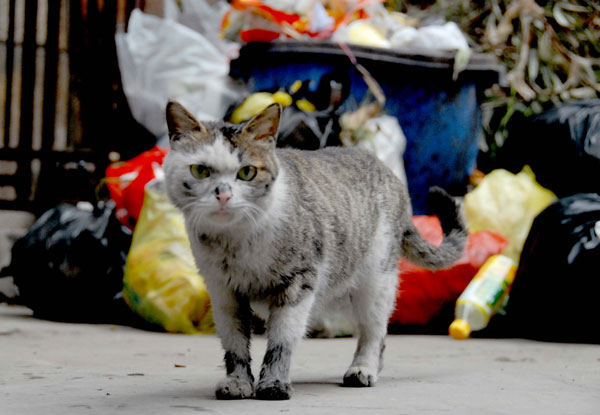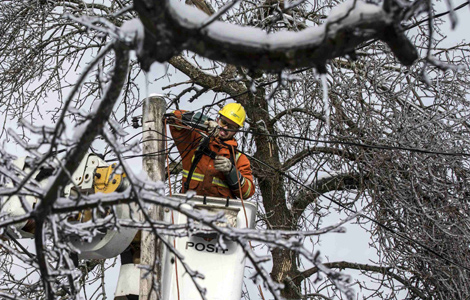Stray animals requires government, civil support
Updated: 2013-12-30 14:04
(Xinhua)
|
||||||||
 |
|
A stray cat in Guiyang, Southwest China's Guizhou province, March 12, 2009. [Photo by Zhang Tianlin/Asianewsphoto] |
NANNING - "We are looking for someone willing to adopt a three-month-old kitty to get her through the cold winter," a non-governmental organization (NGO) wrote in late November on Sina Weibo, the Chinese equivalent of Twitter.
The NGO, called "Nanningliulangmao," or "Nanning's Stray Cats," was founded to help stray animals in Nanning, capital of South China's Guangxi Zhuang autonomous region.
Several animal lovers caught wind of the NGO's search online and contacted the organization immediately. After adoption procedures, the cat was taken home by her new owner, who named her "Cindy."
Not every stray animal in China is as lucky as Cindy. The world has entered an era of too many pets, according to the World Health Organization, and an increasing number of them are deserted by their owners and forced to live on the streets, fighting for rubbish every day.
Deserted animals
Li Qing, a staff member with a rescue station for stray cats and dogs in Nanning, said one big reason for the soaring number of stray animals is abandonment by their owners.
"Many people buy companion dogs purely on impulse and simply desert the puppies when their initial interest fades, creating a big group of stray dogs," Li said.
Some dogs become lost while the owners walk them, and it can be very difficult to find them, Li said, adding that these dogs either become strays or are caught by dog traffickers and traded on the black market.
Dogs can give birth to litters of as many as ten puppies, so owners often just throw the puppies onto the street because raising them would cost too much, which contributes more to the number of strays, according to Li.
Zhou Keda, director of the Institute of Social Sciences with the Guangxi Academy of Social Sciences, said that the concentration of stray animals could cause trouble for human communities and the environment.
"The strays, if not sterilized, saved or adopted properly, could transmit diseases, as they usually live in terrible environments where bacteria, parasites and viruses thrive," Zhou said. WORRISOME FATE OF STRAYS
The fate of stray animals is also becoming a concern for animal lovers. Stories of animal abuse abound and have generated numerous headlines in recent years in China, causing a wave of public fury and spurring hot debate among the general public about the ethical treatment of strays.
In May, dozens of stray cats were abused and brutally slaughtered in a residential district in Beijing, with the fur of the dead cats almost completely plucked out.
In September, a poster was hung on a wall in a district in Nanning alleging that some people had deliberately put poison in the area and killed a dozen cats. The poster warned people to take care of their pets.
Apart from animal abuse, many abandoned animals are easy victims in China, where in many places dog and cat meat are considered delicacies in the local cuisine.
According to official statistics, more than 10 million dogs and 4 million cats are sold annually in the Chinese market for cooking purposes. Of those sold for food, many are stray or stolen animals, according to Li Qing.
Earlier this year, an annual dog meat festival held every summer solstice in Yulin City in Guangxi faced harsh criticism from experts and animal rights activists, but that did not stop local residents from standing by their tradition.
Local residents butchered tens of thousands of dogs on the streets, then ate the meat alongside lychee, believing the practice keeps illness at bay.
Hong Bin, an activist, said that many of the slaughtered dogs are strays that might have been poisoned.

 Second blast kills 10 in Russian city
Second blast kills 10 in Russian city
 F1 legend Schumacher in coma after ski accident
F1 legend Schumacher in coma after ski accident
 Net result
Net result
 Fire on express train in India kills at least 26
Fire on express train in India kills at least 26
 Times Square visitors purge bad memories
Times Square visitors purge bad memories
 Ice storm leaves many without power in US, Canada
Ice storm leaves many without power in US, Canada
 'Chunyun' train tickets up for sale
'Chunyun' train tickets up for sale
 Abe's war shrine visit sparks protest
Abe's war shrine visit sparks protest
Most Viewed
Editor's Picks

|

|

|

|

|

|
Today's Top News
Outrage still festers over Abe shrine visit
Suicide bomber kills 16 at Russian train station
Magazine reveals NSA hacking tactics
Pentagon chief concerned over Egypt
Broader auto future for China, US
Li says economy stable in 2014
Bigger role considered in the Arctic
3rd high-level official probed
US Weekly

|

|








